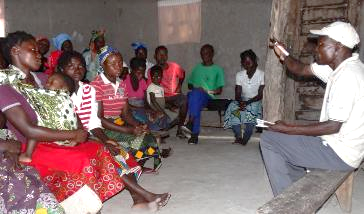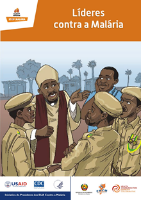
Local leader conducting community group discussion in Zambezia, Mozambique. Photo credit: Felisberto Massingue, Johns Hopkins University-CCP.
Manuel Emiliano Braz, 45, is a well-known community leader in Cahora Bassa, a malaria-affected district in Tete province, Mozambique. Like most local leaders, Braz always considered mosquitoes and malaria as part of the natural history and environment of Cahora Bassa.
“I have always lived surrounded by mosquitoes and, in the past, I had malaria myself. As a community leader, I never saw the merits of trying to do something specific to stop malaria because the disease has been in our community since I was born”, explains Braz adding that, “As a leader we have to choose what problems we can solve. Personally, I always regarded malaria as a disease that we could do very little about; now I know that I was wrong.”
Braz’s perception of malaria prevention and his role as community leader changed completely in April 2017 when for the first time he was invited by the district health authorities to be part of a community leader training on community mobilization against malaria. “It was then that I learned effective ways of preventing malaria. I also learned that, as a community leader, I can play a meaningful role in fighting the disease”, says Braz and adds: “After the training, we received bed nets and communication guides to help mobilize the communities against malaria and demonstrate how to properly use and take of care of bed nets. When I got back to my community, I started convening gatherings in small groups to discuss malaria topics and show people how to use bed nets. Then I started going door-to-door in the communities every day to speak with households on the many ways they could prevent and decrease the impact of malaria. At the end of the first month I realized that I had reached close to one hundred families, which is almost all of my community members.”
The PMI-supported Health Communication Capacity Collaborative (HC3) and the National Malaria Control Program of Mozambique trained a total of 730 community leaders from the most isolated areas, including Braz, to mobilize their communities against malaria in the provinces of Tete, Nampula, Zambézia, and Cabo Delgado. The trainings provided the local leaders with knowledge of the main malaria prevention methods, malaria symptoms and treatment, gender norms that impede malaria prevention, the importance of using the Ministry of Health referral system and the important role of community leaders as champions in fighting malaria.
In the training workshops, the local leaders committed to becoming champions against malaria in their communities and offered to voluntarily lead concrete malaria prevention activities in their communities. On the last day of the workshops, a work plan was jointly developed with community leaders, and support materials were given to help their work in the community.
As a result, the 730 trained leaders led a total of 3,667 bed-net use demonstrations and social behavior change events, reaching a total of 91,679 individuals in the first month after the training. This achievement confirmed the great influence of local leaders for fast and cost-effective community mobilization and for attaining desired coverage, saturation, and rural penetration at scale, from the small villages down to the most isolated localities and communities.

